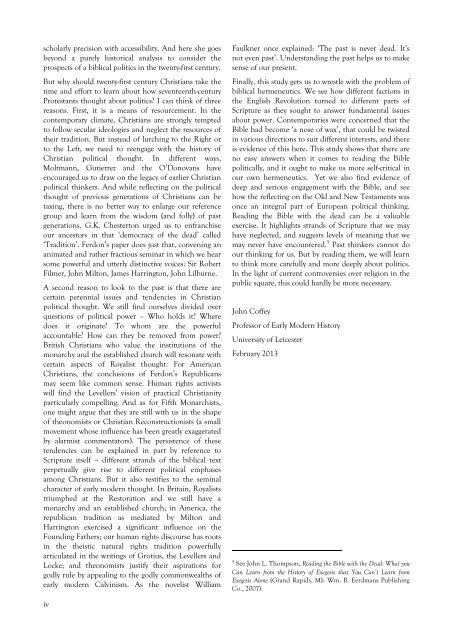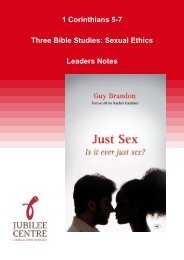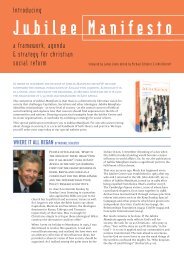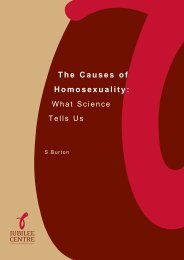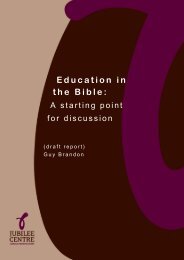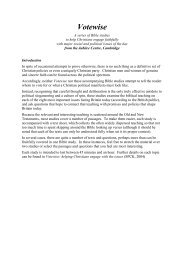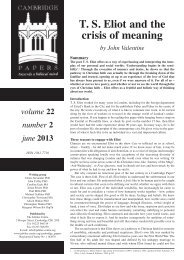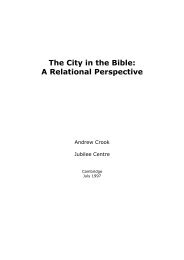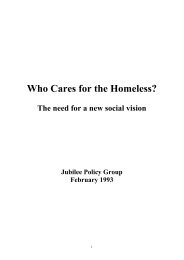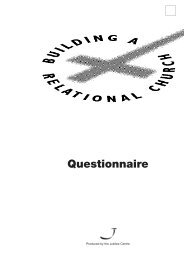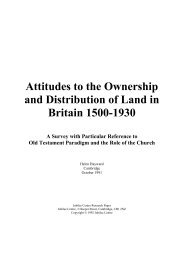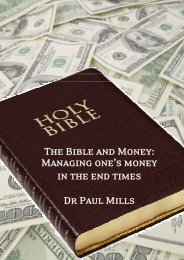Report Template - Jubilee Centre
Report Template - Jubilee Centre
Report Template - Jubilee Centre
You also want an ePaper? Increase the reach of your titles
YUMPU automatically turns print PDFs into web optimized ePapers that Google loves.
scholarly precision with accessibility. And here she goes<br />
beyond a purely historical analysis to consider the<br />
prospects of a biblical politics in the twenty-first century.<br />
But why should twenty-first century Christians take the<br />
time and effort to learn about how seventeenth-century<br />
Protestants thought about politics? I can think of three<br />
reasons. First, it is a means of resourcement. In the<br />
contemporary climate, Christians are strongly tempted<br />
to follow secular ideologies and neglect the resources of<br />
their tradition. But instead of lurching to the Right or<br />
to the Left, we need to reengage with the history of<br />
Christian political thought. In different ways,<br />
Moltmann, Gutierrez and the O’Donovans have<br />
encouraged us to draw on the legacy of earlier Christian<br />
political thinkers. And while reflecting on the political<br />
thought of previous generations of Christians can be<br />
taxing, there is no better way to enlarge our reference<br />
group and learn from the wisdom (and folly) of past<br />
generations. G.K. Chesterton urged us to enfranchise<br />
our ancestors in that ‘democracy of the dead’ called<br />
‘Tradition’. Ferdon’s paper does just that, convening an<br />
animated and rather fractious seminar in which we hear<br />
some powerful and utterly distinctive voices: Sir Robert<br />
Filmer, John Milton, James Harrington, John Lilburne.<br />
A second reason to look to the past is that there are<br />
certain perennial issues and tendencies in Christian<br />
political thought. We still find ourselves divided over<br />
questions of political power – Who holds it? Where<br />
does it originate? To whom are the powerful<br />
accountable? How can they be removed from power?<br />
British Christians who value the institutions of the<br />
monarchy and the established church will resonate with<br />
certain aspects of Royalist thought. For American<br />
Christians, the conclusions of Ferdon’s Republicans<br />
may seem like common sense. Human rights activists<br />
will find the Levellers’ vision of practical Christianity<br />
particularly compelling. And as for Fifth Monarchists,<br />
one might argue that they are still with us in the shape<br />
of theonomists or Christian Reconstructionists (a small<br />
movement whose influence has been greatly exaggerated<br />
by alarmist commentators). The persistence of these<br />
tendencies can be explained in part by reference to<br />
Scripture itself – different strands of the biblical text<br />
perpetually give rise to different political emphases<br />
among Christians. But it also testifies to the seminal<br />
character of early modern thought. In Britain, Royalists<br />
triumphed at the Restoration and we still have a<br />
monarchy and an established church; in America, the<br />
republican tradition as mediated by Milton and<br />
Harrington exercised a significant influence on the<br />
Founding Fathers; our human rights discourse has roots<br />
in the theistic natural rights tradition powerfully<br />
articulated in the writings of Grotius, the Levellers and<br />
Locke; and theonomists justify their aspirations for<br />
godly rule by appealing to the godly commonwealths of<br />
early modern Calvinism. As the novelist William<br />
Faulkner once explained: ‘The past is never dead. It’s<br />
not even past’. Understanding the past helps us to make<br />
sense of our present.<br />
Finally, this study gets us to wrestle with the problem of<br />
biblical hermeneutics. We see how different factions in<br />
the English Revolution turned to different parts of<br />
Scripture as they sought to answer fundamental issues<br />
about power. Contemporaries were concerned that the<br />
Bible had become ‘a nose of wax’, that could be twisted<br />
in various directions to suit different interests, and there<br />
is evidence of this here. This study shows that there are<br />
no easy answers when it comes to reading the Bible<br />
politically, and it ought to make us more self-critical in<br />
our own hermeneutics. Yet we also find evidence of<br />
deep and serious engagement with the Bible, and see<br />
how the reflecting on the Old and New Testaments was<br />
once an integral part of European political thinking.<br />
Reading the Bible with the dead can be a valuable<br />
exercise. It highlights strands of Scripture that we may<br />
have neglected, and suggests levels of meaning that we<br />
may never have encountered. 5 Past thinkers cannot do<br />
our thinking for us. But by reading them, we will learn<br />
to think more carefully and more deeply about politics.<br />
In the light of current controversies over religion in the<br />
public square, this could hardly be more necessary.<br />
John Coffey<br />
Professor of Early Modern History<br />
University of Leicester<br />
February 2013<br />
5<br />
See John L. Thompson, Reading the Bible with the Dead: What you<br />
Can Learn from the History of Exegesis that You Can’t Learn from<br />
Exegesis Alone (Grand Rapids, MI: Wm. B. Eerdmans Publishing<br />
Co., 2007).<br />
iv


